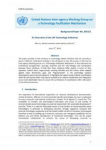The UN Inter-Agency Working Group on a Technology Facilitation Mechanism (TFM) has issued a draft paper on technology-related initiatives undertaken by the UN system at the global, regional and country levels.
It finds that initiatives that support (directly or indirectly) the implementation of the post-2015 development agenda and its Sustainable Development Goals (SDGs) differ greatly in terms of their approach, content focus, target groups, working methods and size.
It highlights gaps and fragmentation in the “technology capacity development system,” and the urgent need for better coordination within the UN.
 July 2015: The UN Inter-Agency Working Group on a Technology Facilitation Mechanism (TFM) has issued a draft paper on technology-related initiatives undertaken by the UN system at the global, regional and country levels. It finds that initiatives that support (directly or indirectly) the implementation of the post-2015 development agenda and its Sustainable Development Goals (SDGs) differ greatly in terms of their approach, content focus, target groups, working methods and size. It highlights gaps and fragmentation in the “technology capacity development system,” and the urgent need for better coordination within the UN.
July 2015: The UN Inter-Agency Working Group on a Technology Facilitation Mechanism (TFM) has issued a draft paper on technology-related initiatives undertaken by the UN system at the global, regional and country levels. It finds that initiatives that support (directly or indirectly) the implementation of the post-2015 development agenda and its Sustainable Development Goals (SDGs) differ greatly in terms of their approach, content focus, target groups, working methods and size. It highlights gaps and fragmentation in the “technology capacity development system,” and the urgent need for better coordination within the UN.
The paper, titled ‘An Overview of the UN Technology Initiatives,’ is based on two questionnaires for UN entities in 2015 and an analysis of 40 initiatives. It describes the landscape of technology-related initiatives, including institutional arrangements, coverage, functions, and inter-linkages and coordination.
On institutional arrangements, the paper outlines three categories of technology-related initiatives, namely: i) initiatives related to environmental treaties or related conventions, or “other legally binding agreements, with multiagency partnerships”; ii) initiatives, established, governed and/or maintained by “UN agencies with partnerships” but without specific treaties, conventions or legally binding agreements; and iii) initiatives managed solely by one UN agency with time-bound tasks. The authors report that approximately half of the initiatives are managed solely by one UN agency, as single-agency initiatives.
On coverage, the paper notes that technology-related initiatives are at different stages of maturity, in terms of coverage of the technology cycle and resources mobilized and allocated. The authors call for increasing efforts in terms of: mapping of country needs and non-UN initiatives; exchanging expertise and enhancing synergies between UN agencies and non-UN initiatives; and allocating resources for the promotion of relevant technology exchanges and for translating global Science, Technology and Innovation (STI) policy frameworks to national STI actions.
On functions, the paper categorizes technology-related initiatives in three groups: convening (networking, agenda shaping, consensus building); knowledge (creation, sharing and exchange of data, research, policy advice, practical experiences); and resource mobilization (financing, matchmaking, installation). It concludes that successful implementation of the SDGs and the post 2015 development agenda may require shorter cycle from political will to resource mobilization and enhanced connections between global frameworks and national actions.
On inter-linkages and coordination, the authors outline the need to: better coordinate UN initiatives, as well as capacity building initiatives and their monitoring and evaluation.
The paper does not cover other multilateral, bilateral, or private initiatives. According to the authors, the paper is not meant to be conclusive or prescriptive, and most of its sections outline points for discussion.
The paper is also issued as a working paper of the UN Inter-Agency Task Team (IATT) on STI for the SDGs, which is made up of some members of the informal IAWG on TFM. The IATT is a component of the TFM agreed in the context of the Addis Ababa Action Agenda and 2030 Agenda for Sustainable Development. According to the TFM Website, the IATT will be open to the participation of all UN agencies, funds, programmes and regional commission of the Economic and Social Council (ECOSOC). [Background Paper 2015/1: An Overview of the UN Technology Initiatives] [Technology Facilitation Mechanism Website] [IISD RS Policy Update on TFM]